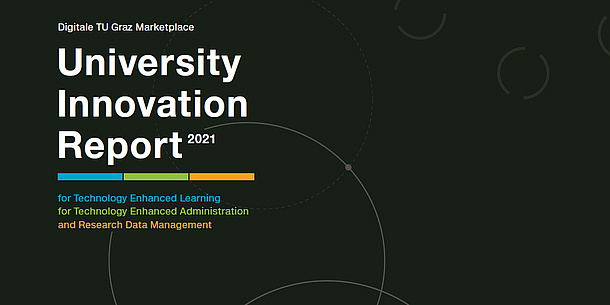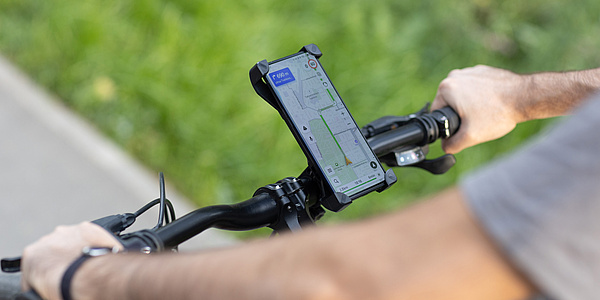University Innovation Report 2021 presents digital innovations and concepts in Higher Education

Graz University of Technology (TU Graz) has been intensively addressing digital transformation since 2017 and was the first Austrian university to adopt a digitalization strategy in 2018. Since then, work has been under way on digitalization processes for the university’s core areas of teaching, research and administration as part of the strategic project “Digital TU Graz”. The idea was that digital technologies should be used where they are of concrete use to staff, researchers and students and open up new opportunities.
Marketplace promotes exchange of innovative ideas
One of the lighthouse projects of the Digital TU Graz is the participatory innovation programme Digital TU Graz Marketplace, which sustainably transfers methodological and technical innovations into university practice in the form of funded pilot projects. Researchers, teachers and students at TU Graz submit pilot projects and develop them together. An expert committee consisting of researchers from the fields of computer science, psychology, educational sciences and educational research selects the projects and supports them. Out of a total of 40 submissions since 2019, 23 projects have been funded so far.
The projects range from digital innovations in teaching, MOOCs (Massive Open Online Courses) or ideas that make everyday life at the university easier, to digital research data management. They are now all presented together for the first time in the University Innovation Report 2021. Some of the tools, applications and didactic concepts have already been rolled out at TU Graz, while others are still in development.
Click here to go directly to the e-paper: University Innovation Report 2021 (German only)
Digital assets for the entire higher education sector
Already in use is the Learning Goal Widget, an online tool for tracking learning goals. “With this tool, teachers get the opportunity to structure their courses even better, and students in turn get a good overview of the course topics and information on exam preparation,” explains Katharina Maitz from the Institute of Interactive Systems and Data Science and research assistant in the Marketplace project. The tool is already in use at TU Graz and will also be available in the future as an open-source plug-in for learning platforms at other universities (Further details can be found in the report on page 27).
In the area of administration and management, work is being done on solutions that reduce the work load of employees and students in their everyday work and university life and are aimed at service orientation. For example, one project focuses on digital and cryptographically secured educational credentials (project name: Verifiable Credentials for Student Mobility). The aim is to provide diplomas or certificates of completed examinations in digital form, which students can transmit to their future employers or other universities via interfaces as machine-readable data, while at the same time preserving privacy. These are also open-source solutions that institutions outside TU Graz can use and further develop for themselves (Details on page 36).
In the area of research, seven pilot projects are being funded that deal with the topic of research data management from different perspectives and in different areas. For example, the use of electronic laboratory notebooks is analysed and applied, the publication and long-term archiving of research data on suitable repositories such as the TU Graz Repository is prepared and carried out, and the evaluation of data is tested with the aid of CyVerse Austria – a joint platform of TU Graz, the University of Graz and the Medical University of Graz within the framework of the inter-university cooperation BioTechMed Graz.
“The path from a digital idea to a sustainable nationwide service is a long one. The University Innovation Report shows how the process can be successfully completed,” says the Vice Rector for Digitalization and Change Management Claudia von der Linden, who once again underlines TU Graz’s pioneering role in this field with reference to the report and the strategic project Digital TU Graz. This is also reflected in the funding provided by the Federal Ministry of Education, Science and Research (BMBWF), which has invested 12.2 million euros in pioneering digitalization projects at TU Graz and its cooperation partners as part of the “Digital and Social Transformation in Higher Education” call for proposals.
Kontakt
Katharina MAITZ
BA BA MA PhD
TU Graz | Institute of Interactive Systems and Data Science
Phone +43 316 873 32803
k.maitz@tugraz.at




